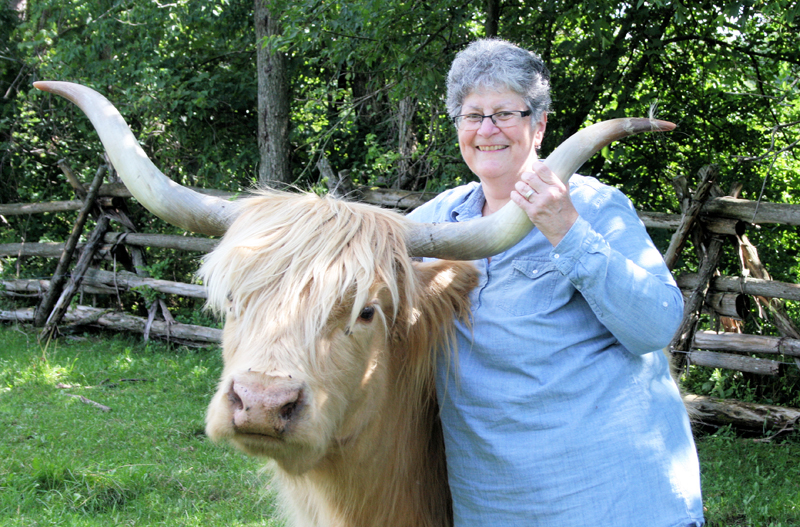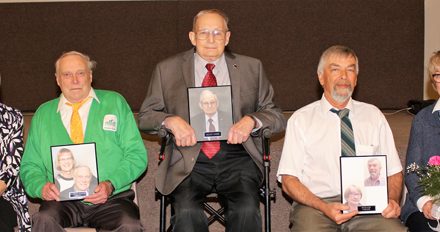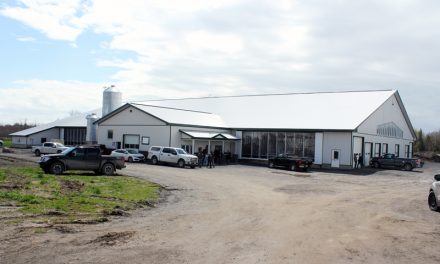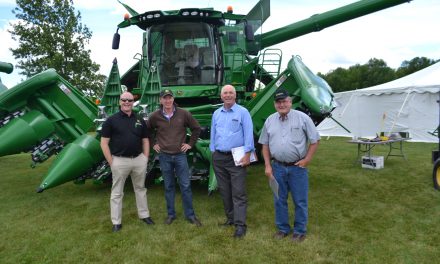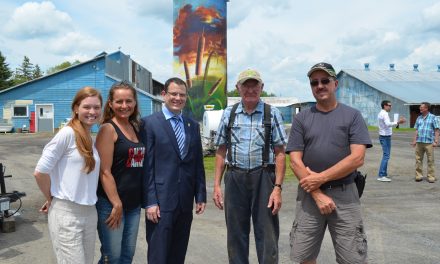Standing beside Phoenix, one of the Highland cows on her Beckwith Township farm in Lanark County, Andrea McCoy-Naperstkow is vying to be the next director for Zone 8 on the OFA board. Pinder-Moss photo
by Dianne Pinder-Moss
AgriNews Contributor
LANARK COUNTY – As a board member of the Lanark Federation of Agriculture (LFA) for the past 10 years, including two terms as president, Andrea McCoy-Naperstkow believes strongly in the work of its provincial counterpart, the Ontario Federation of Agriculture (OFA).
She, however, is concerned that there is “a disconnect” between Eastern Ontario and the head office of the OFA in Guelph.
“People are just disillusioned, especially in Eastern Ontario, with the OFA,” she told The AgriNews in an interview.
Because federation membership numbers tend to be lower here than in Southern Ontario, according to McCoy-Naperstkow, there is “the feeling that agriculture ends on the west side of the GTA.” As well, she points out, that while there is “a gamut” of commodity groups represented by the OFA – it is no longer just beef and dairy, she cites, but also cash crops, organic farmers, Christmas trees, honey, berries, etc. – not all commodities feel that they are being heard by the provincial body.
“There’s so much diversity in agriculture and that’s what the OFA talks about,” she remarked. “Sometimes, (however), they don’t emphasize the smaller commodities.”
McCoy-Naperstkow is determined to change that perception. That is why the resident of Beckwith Township resident has put her name forward as a candidate in the zone director elections against incumbent Debra Pretty-Straathof of Renfrew County in Zone 8.
Zone 8, which takes in the region of Lanark, Renfrew, Ottawa and Arnprior, is one of only two areas across Ontario in which elections are being held. The other is also in Eastern Ontario – Zone 11 (region of Dundas, Frontenac, Grenville and Leeds).
A third-generation farmer in Lanark County, McCoy-Naperstkow lives with her husband Arvin Naperstkow on the family farm. The couple run a crop and beef operation with approximately 35 Highland cattle, as well as being involved in custom haying.
“I have a passion for agriculture and farming,” she says in sharing how one of her best summer jobs was as an 18-year-old working with her dad on their then dairy farm.
Just as farming is in McCoy-Naperstkow’s blood, the same could perhaps be said of her involvement with the federation of agriculture. Her late mother Inez McCoy was a regional director for the OFA representing Lanark County in the 1970s. Likewise, she has discovered that her late father Gordon McCoy was a director and held a position on the executive of the Beckwith Federation of Agriculture in the late 1940s and 1950s.
McCoy-Naperstkow has taken on a greater role with the LFA board since she retired from working for the City of Ottawa in Social Services and Parks and Recreation in June 2014. Along with being involved in organizing first-aid training courses for members and farm tours for local municipal councillors, she has been part of the Hill Lobby and is a member of the county Agricultural Advisory Working Group. In addition, she has moderated both federal and provincial all-candidates meetings, as well as information sessions sponsored by the federation.
Currently a director with the LFA, McCoy-Naperstkow believes she can be an effective and strong voice at the board table of the OFA. For her, being a zone director is all about “service to your community and service to the membership” – taking a grassroots approach to the position.
“I see my role really as representing the membership of the OFA that are in Zone 8,” she explains. “That is bringing their concerns and issues to the table – issues specific to the zone and Eastern Ontario.”
Among these issues is the adverse impact the record rainfall in the zone this year – preceded by drought conditions in 2016 and a mild winter – has had on the planting, growing and harvesting of crops. It’s a situation, she says, that is “pretty devastating” to the agricultural industry here.
“I want to work with the county federations, as well as the OFA board, and move forward concerns to the provincial government to get support and solutions,” she noted.
Other issues that have been brought to her attention in recent months include:
- Municipal land tax assessments;
- Farm land values;
- Land use planning and urban development;
- Livestock kill compensation program changes;
- Minimum wage;
- Wet land designations;
- Noxious weeds;
- Rural broadband;
- Climate change;
- Taxation on value-added operations;
- Hydro, energy and natural gas costs;
- Rural schools.
Another matter of concern for McCoy-Naperstkow is the mental health of farmers, particularly with what they’ve had to endure weatherwise the past two years. She points to an online stress and resilience survey undertaken by the University of Guelph from September 2015 to January 2016, in which 1,100 farmers across Canada responded. One of the survey findings was that stress, anxiety, depression and emotional exhaustion are higher among farmers than other groups.
“Mental health is a very important issue across the board,” she asserted.
The zone director’s position carries a three-year term with the new term taking effect on Nov. 22. The job is a busy one entailing attending the monthly directors’ meetings for each of the regions in the zone, as well as travelling to Guelph for a few days each month for the OFA board meeting. Also, as part of being available to the membership, the zone director attends fairs, farm shows and other community and agricultural related events.
McCoy-Naperstkow says she is ready to make that commitment.
“I have the blessing of my family and have worked it out with the farm that there’s enough help so I can take time to go to board meetings (in Guelph),” she mentioned.
McCoy-Napersktow says she has a great deal of respect for Pretty-Straathof and considers her to be a friend. In her view, they simply have different skills sets.
“Our views are different, our approaches are different,” she stated. “Right now, I feel my approach may be what the membership needs.”
A mailout was sent to the approximately 1,500 federation members in Zone 8 in early August explaining the voting process. The mailout included information about the candidates running and the three options for voting – mail-in ballot, by phone or online.
Voting commenced on Aug. 21 and will close on Fri., Sept. 8. McCoy-Naperstkow is hoping for a better voter turnout than the average five to 10 per cent previously reported in the past for zone director elections across the province.
“People should vote because they are members of an organization that has the ability to work on their behalf on many issues,” she asserted.

